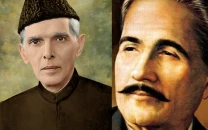Migration issues: Govt asked to push host states to protect expats’ rights
Experts discuss effects of migration on social, cultural and economic dynamics of migrant workers.

Experts discuss effects of migration on social, cultural and economic dynamics of migrant workers. DESIGN: JAMAL KHURSHID
A two-day international conference on migration, education and development concluded at the Quaid-i-Azam University (QAU) on Friday with the message that Pakistan needs to legislate on migration issues and also push host countries to protect the rights of expatriates.
The conference was organised by the QAU Department of Anthropology in collaboration with the Department of Social Anthropology of UK’s Sussex University. The event was supported by the British Council and the Higher Education Commission of Pakistan among other organisations.
During a day that was jam-packed with conference sessions and research presentations, members of the academia shared their findings on the role of migration in education, health and areas of socio-economic development.
The conference provided a platform to discuss a scientific evidence-based assessment of the effects of migration on the social, cultural and economic dynamics of migrant workers and their families, both at home and abroad. In the field of education alone, the participants discussed issues such as the role of remittances in supporting education and the flight of intellectual capital.
Details were also shared about a joint research project between QAU and the Sussex University under the British Council and HEC’s Inspire project for Pak-British university collaborations.
The research, which focused on remittances in education sector, found that families in which one person was working abroad seemed to value education for their children more than non-migrant families in the same localities.
In Azad Kashmir especially, the third and fourth generations of British Pakistanis, while living abroad themselves, appeared to have created awareness about education among local youth, according to the research. At the same time, the migrant families appeared to care for lavish lifestyles and real estate purchase.
The participants said Pakistan is one of the largest importers of immigrants and its economy relies heavily on remittances sent back by overseas Pakistanis. At the same time, speakers noted that there was a lack of significant policy-making to protect the migrant workers or to prevent brain drain.
An important observation that was also discussed during the closing ceremony was that a lot of host countries, especially Gulf states where Pakistanis go to work have not ratified international conventions on the rights of migrant workers.
The speakers during the closing session stressed the need for the government to lobby with host countries to offer protections to Pakistani workers in accordance with international rules.
For Pakistani women who are married into expatriate Pakistani families, speakers suggested there should be clauses in their Nikahnama that can protect them from abuse and violence.
The recommendations from the conference will be summarized and released soon, said Dr Waheed Chaudhry, a professor of Anthropology at QAU who moderated the closing session.
QAU Vice-Chancellor Dr Etzaz Ahmad distributed certificates among the conference participants during the closing ceremony.
Published in The Express Tribune, March 29th, 2014.



















COMMENTS
Comments are moderated and generally will be posted if they are on-topic and not abusive.
For more information, please see our Comments FAQ